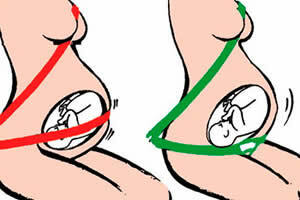Since we have months of 28, 30, and 31 days, some doctors often suggest that calculations for a woman's length of pregnancy be done according to the lunar calendar. This basically means considering the following:
- 1 lunar week = 7 days
- 1 lunar month = 4 weeks of 7 days = 28 days
As the period between the beginning of pregnancy and the day of delivery is about 280 days, we can see that this value corresponds to 40 weeks. Since a lunar month is 4 weeks, 40 weeks of pregnancy corresponds to 10 lunar months.
Now that you understand these accounts, let's move on to talking about the fourth month of pregnancy. During this period, between the 13th and 16th lunar week, the body of the fetus is fully formed, and increasingly proportional. Also, your eyes and ears take definite positions.
Its length, in the 13th week, is approximately 73 millimeters and weight, 20 grams. At the end of the 16th, it will be about 115 millimeters and 85 grams.
The eyelids are significantly developed, as are the neck, vocal cords, larynx, skeleton and many of its internal organs. He is already able to close his hands and, surprisingly, his fingers are already fingerprinted. The lanugo (a kind of down that protects the body) appears, as well as the eyebrows and hair. The cheeks and the tip of the nose also begin to show.
The genitals are evident, making it possible to identify the child's sex. She also starts to control many of her voluntary muscles, starting her first movements. Thanks to the involuntary muscles, you can also hiccup. In these weeks, too, the baby has different facial expressions; and is more receptive to light, sound, etc. stimuli.
As for the mother, some granules appear on the nipples, more specifically on the areola, called Montgomeri tubercles. They (nipples) appear darker; and the breasts, considerably larger. It is during this period that colostrum, a substance rich in nutrients and antibodies, is usually formed.
As far as the size of the belly is concerned, it is variable. It may be already accentuated, or not. However, during these weeks, it tends to grow faster and, for this reason, the abdomen can become sore.
Do not stop now... There's more after the advertising ;)
The woman gets a little more fat. On the other hand, his irritability diminishes, as does his nausea; and the libido tends to return. Muscles and joints are more relaxed, thanks to the action of a hormone with the suggestive name: relaxin.
Discharges (leukorrhea) are common, but need to be analyzed by the gynecologist. Other symptoms that can be bothersome are: excessive salivation, rapid heartbeat, itchy skin, nasal congestion and, in some cases, nosebleeds. They are all perfectly normal.
Feeding the pregnant woman:
At this stage, thanks to the baby's skeletal development process, the demand for calcium is significant. Thus, pregnant women should not forget about foods such as milk and dairy products, spinach, broccoli, kale, watercress, almonds, sesame and oats.
As the child also grows a lot at this time, a balanced diet becomes even more important; as well as the ingestion of water and other liquids.
Important:
As the belly tends to swell a lot, maybe sleeping becomes an almost impossible mission. However, some measures, such as sleeping on your side (preferably under the left side of the body) or surrounding yourself with pillows, can be alternatives that help in this regard.
The stretching of the skin, due to the increase in measurements, can lead to the appearance of stretch marks. Thus, to avoid them, it is important to hydrate well the regions most susceptible to this problem, such as the hips, stomach and breasts. As for this last part of the body, as it grows a lot at this stage, the use of firm and comfortable bras is recommended.
Varicose veins can also appear. So, wear elastic stockings, avoid high heels and tight pants, rest your legs from time to time, and do light exercise; are good preventive measures.
In addition, if you are in a car, the pregnant woman cannot neglect her seat belt. To do this, it must be placed as shown in the figure:

Fourth month of pregnancy: how to put on the seat belt.
Remember that having sex during pregnancy is generally not contraindicated.
See more!
Third month of pregnancy
fifth month of pregnancy
By Mariana Araguaia
Biologist, specialist in Environmental Education
Brazil School Team

